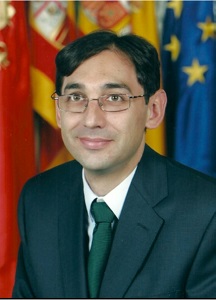Jean-François Thémines, Normandie Université, ESO (France)

The idea of "relationship to the world" as a tool for didactic analysis of geography teaching issues
The presentation will be based on a research in didactics of geography conducted in various French regions (1020 students) to understand how students of cycles 3 and 4 (9-15 years old) seize the school geography whose prescriptions were renewed (competences, conceptual writing and thematic programs), to engage for their part a reflection on space and geography. The discussion of the results will take as its common thread the idea of "relationship to the world". The aim will be to identify how school geography is appropriated by these students as a resource for thinking about the world and, in a more prospective approach, what potential can be developed with a view to geographic training for the world of tomorrow.
Nicola Walshe, UCL (Londres)

Turbulence in the Anthropocene? Intersections and frontiers for geography education in unprecedented times
We are currently inhabiting a world facing what have been described as an unprecedented set of challenges: the climate emergency and associated environmental catastrophes; the increasingly stark eruption of inequalities precipitated by continuing economic fallout from the Global Financial Crisis and the Covid-19 pandemic; the refugee crisis driven by the cumulative action of wars and climate change; and racial inequalities, xenophobia and white supremacy, all highlighting the urgency of “confronting the deafening silence on race in geography education” (Puttick and Murrey, 2020, p.126). These challenges are increasingly impacting on children and young people’s everyday lives and wellbeing and, perhaps as a result, they are themselves playing a progressively more central role in demanding action from those in power, as illustrated through the Fridays for Future climate strike movement. Bruno Latour (2018) suggests that to address these interrelated crises, to respond to the politics of the Anthropocene, we need “something like a map of the positions imposed by the new landscape within which not only the affects of public life but also its stakes are being redefined” (p.2). This keynote will argue that, within this complex and turbulent world, the discipline of geography and, thereby geography educators, have a distinct role in responding to this call. It will then go on to explore the extent to which this might necessitate us to critically rethink our collective response, asking what curriculum for the emerging generation of Anthropoceneans?
Latour, B. (2018) Down to Earth. Politics in the New Climatic Regime. Cambridge: Polity Press.
Puttick, S. and Murrey, A. (2021) Confronting the deafening silence on race in geography education in England: learning from anti-racist, decolonial and Black geographies, Geography, 105(3), 126-134.
Rafael De Miguel González, President of EUROGEO

100 years of geography and international education
In 2022 we celebrate the centenary of the creation of the International Geographical Union (IGU), although Geography is a much older discipline, dating back to the time of ancient civilizations. Geography’s consolidation as a science coincides in time with the establishment of the universal education systems for the entire school population that were implemented in European countries throughout the nineteenth century. Since then, Geography education was conceived from a national perspective as it was codified through the different national Geographical Societies and Geography education associations. This trend continued until the end of the first half of the 20th century. Despite the creation of IGU in 1922 and the holding of various International Geographical Congresses (both in previous and subsequent decades), it wasn't until the 17th IGU Congress held in Washington D.C. in 1952, when the Commission on Geographical Education (IGU-CGE) was formalized as a true promoter of international geographical education thanks to the support of UNESCO. Since then, the internationalization of geographical education has been promoted by the IGU-CGE in four ways: i) by organizing its own symposia (or geographical education sessions within the International Geographical Congresses), ii) publishing various Source Books for geography teaching, iii) proclaiming different International Charters and Declarations and iv) working with national and international geographical organisations. However, the IGU-CGE has focused on concepts like international understanding, international cooperation, an international action plan on global understanding, as well as collaboration with other important associations dealing with 2 geography education, such as the National Council for Geographic Education (NCGE), the European Association of Geographers (EUROGEO), the Geographical Association (GA), and the American Association of Geographers (AAG).
